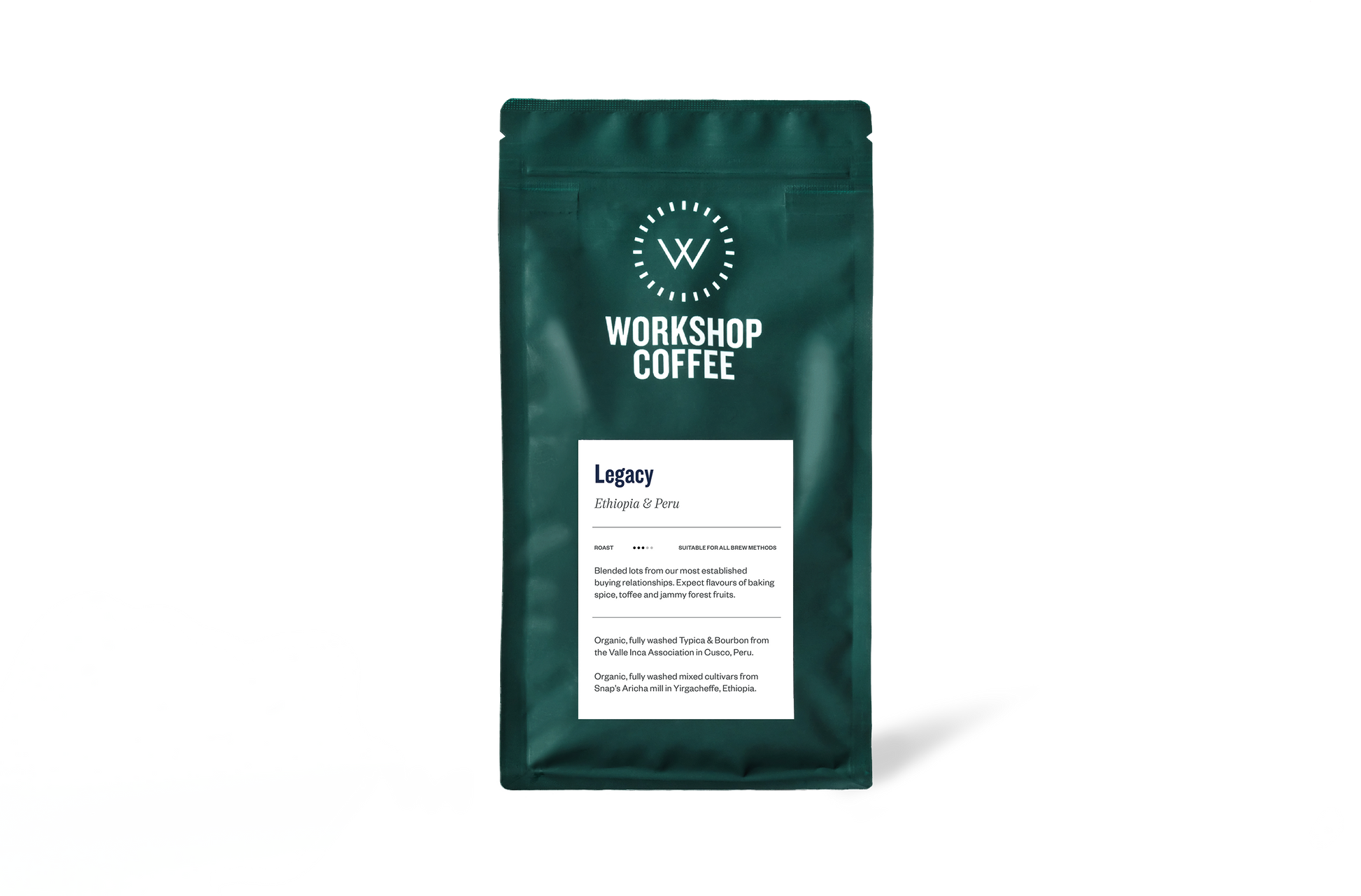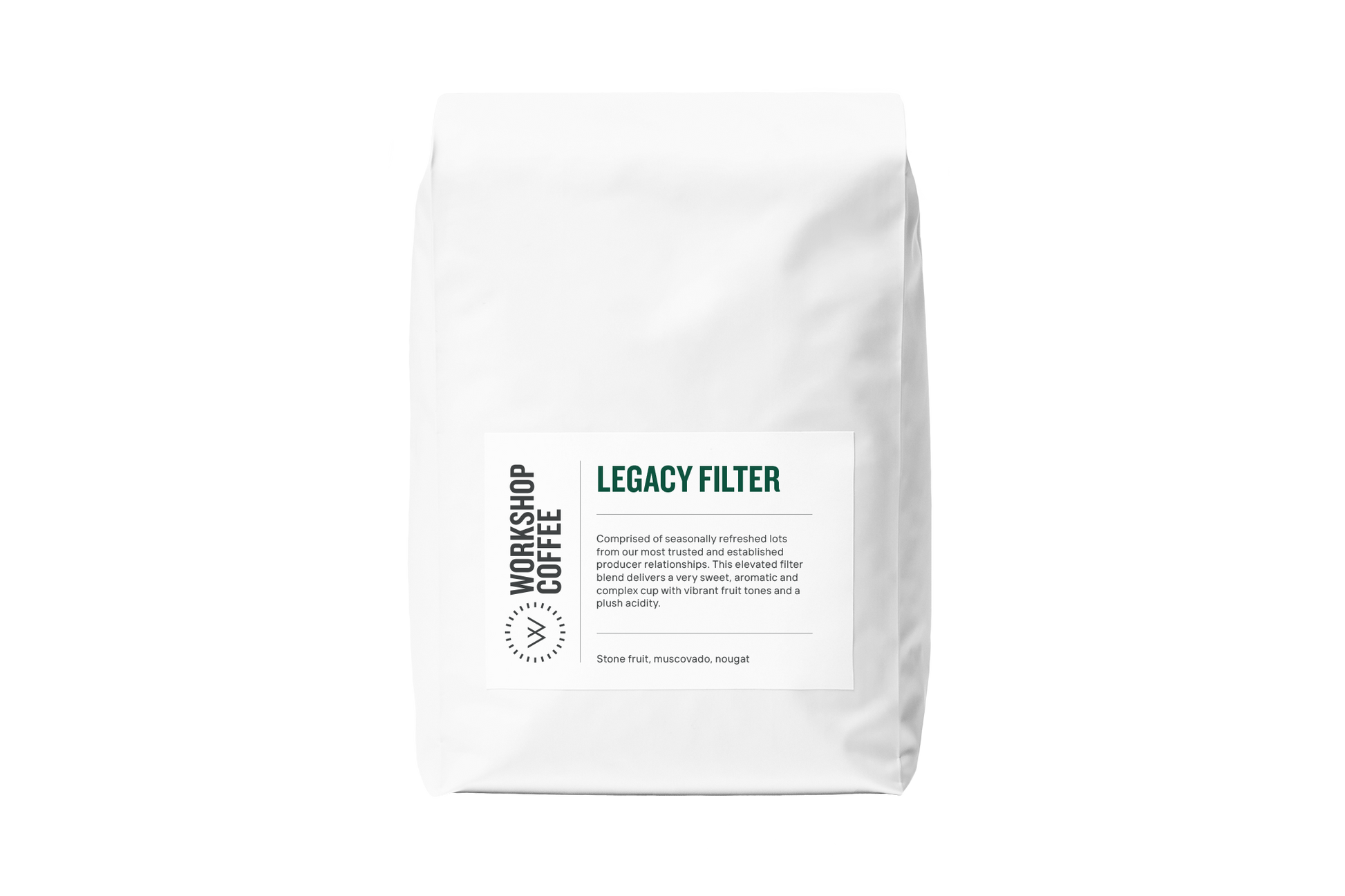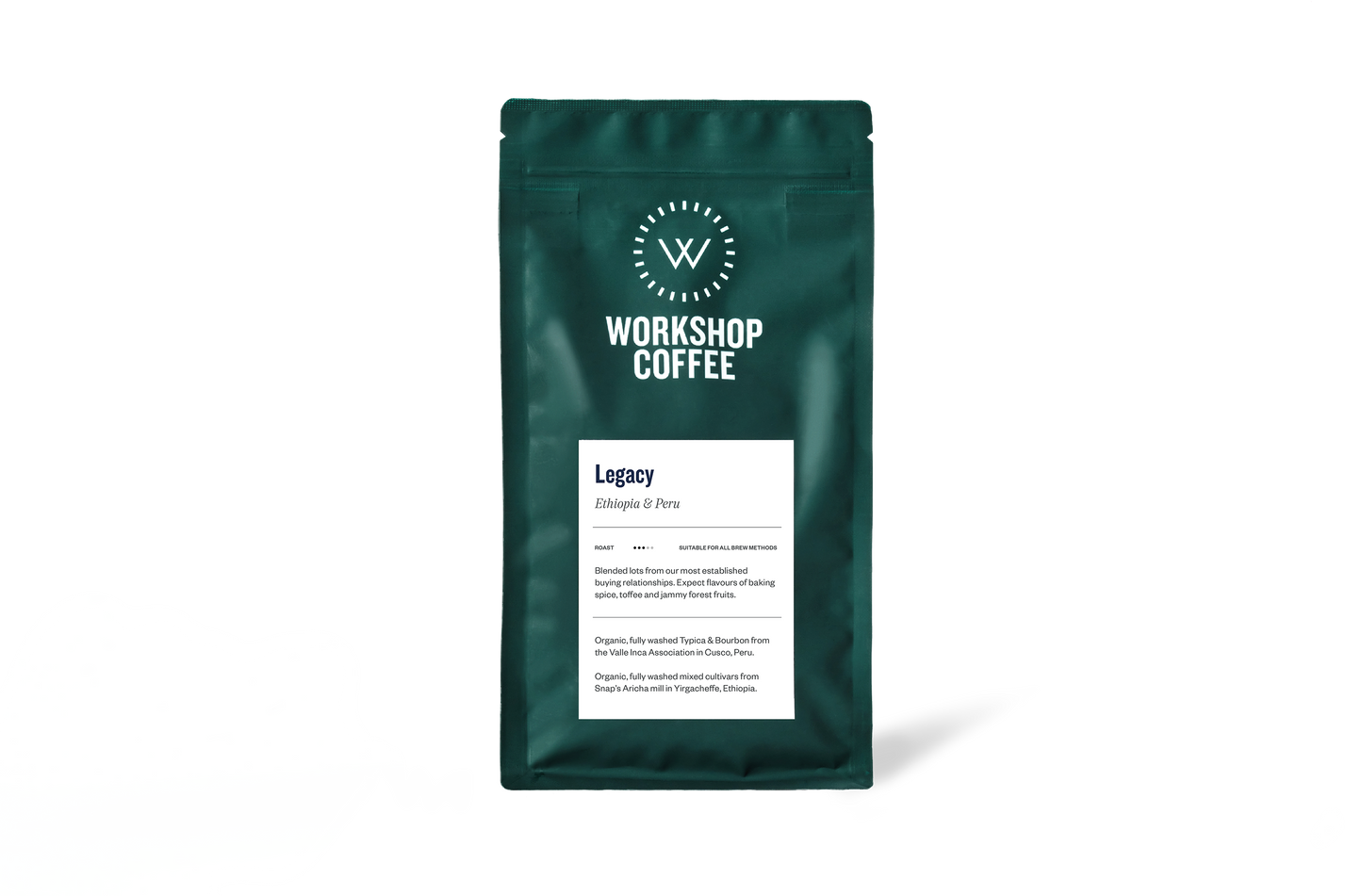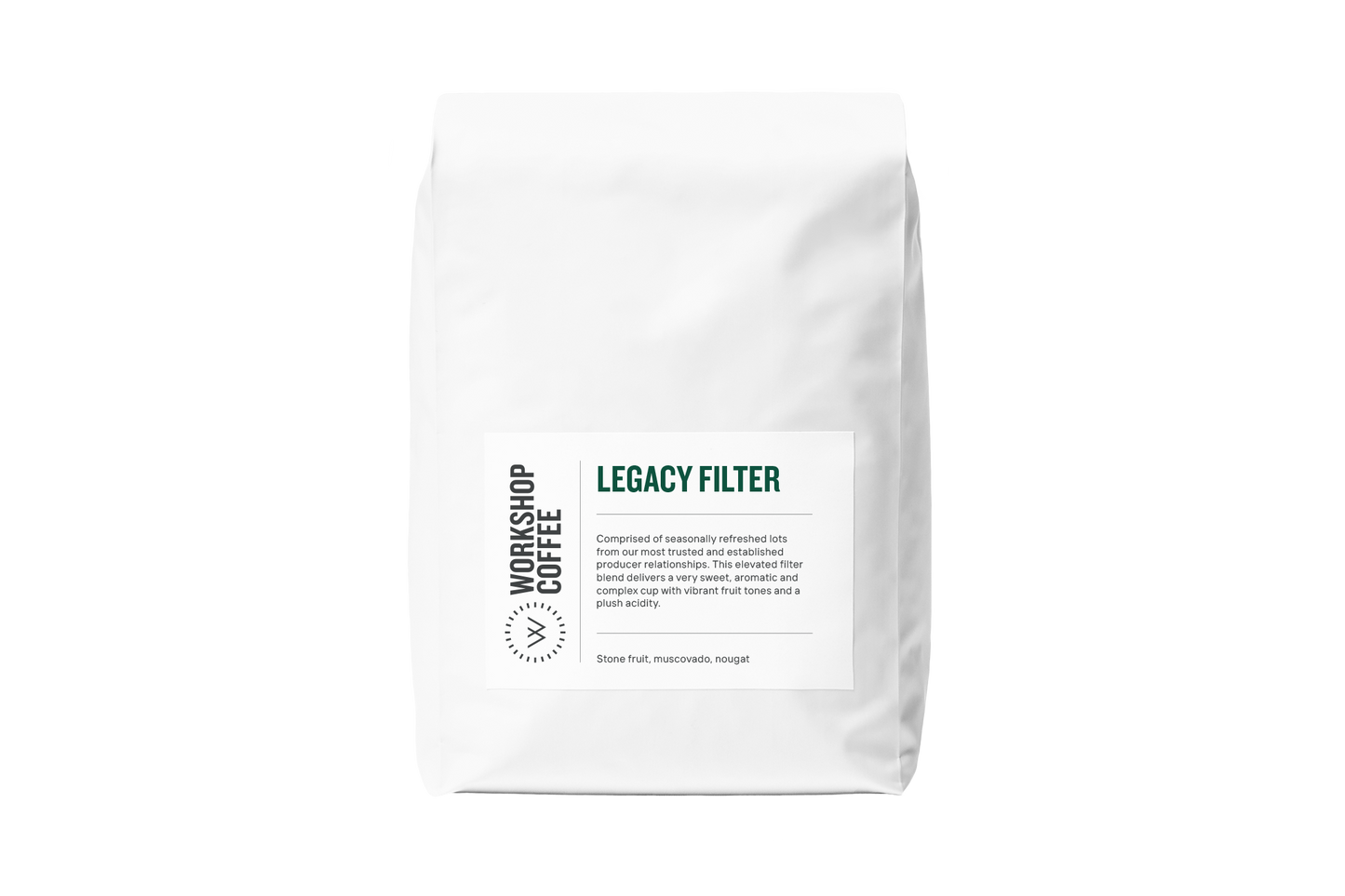

Legacy
Legacy
Baking spice, toffee, jammy.
Comprised of seasonally refreshed lots from our most trusted and established producer relationships. Roasted for all brewing methods, this elevated blend delivers a sweet and complex cup with flavours of baking spice, toffee and jammy forest fruits.
Couldn't load pickup availability


- Our whole bean coffee is nitrogen flushed to prolong freshness.
- 250g bags made from post-consumer recycled plastic.
Product information
Product information
Developing this blend has been driven through the desire to support our core producer groups through paying premium prices for larger volumes and more lots of coffee. The flavours are very complementary, and we have been honing our roasting approach to ensure the resulting cups are harmonious and balanced. We really hope you enjoy this coffee and are grateful for your support.
Colca, Peru
We’re always impressed by the sweetness, structure and overall performance of the high-quality outturns from members of the Valle Inca Association in Cusco, Peru. Here we have a community lot of washed Bourbon and Typica selections from the group to run as the Peruvian base component in our house concept blend, Legacy.
The Producers
The farmers who are contributing coffee to this community blend are following agronomical advice from the Valle Inca group, and working in an ecologically holistic fashion, as well as carrying an organic certification. Farms have Pacay trees planted for shade and to encourage biodiversity. There are many secondary food crops including Rocoto peppers, chirimoyas, oranges, avocadoes and limes. The most common method for nourishing the coffee trees is to apply a homemade compost, composed primarily of spent coffee pulp and bird poo. Some of the farmers are working to ensure moisture is kept in the soil if they are in a more arid area, whereas those for whom there is excess humidity are pruning back the lower growth on their coffee trees to promote adequate ventilation.
Their Approach
Coffees are harvested by hand and floated to remove underripes before they are fed through a manually cranked depulper. Coffee cherry skins are removed during a sieving stage before the clean parchment is placed into GrainPro sacks before being sealed into plastic barrels fitted with a carboy style airlock. After a period between 20 and 40 hours has passed the native microbiome has broken down the mucilage surrounding the coffee’s parchment layer and is ready to be washed off. Valle Inca have funded the building of drying infastructures at many of their members’ farms, and these allow the lots to be dried in ventilated secadores on raised beds, which we are confident is adding to the stability, uniformity and reliability of their producers’ coffees.
The Association
In 2018, our first year buying coffee through Valle Inca, the group had around 100 members. Thanks to word of mouth, with producers telling their neighbours of the premium prices that they were able to receive having been able to access a more discerning coffee market through the association, the group now works with around 300 producers in the Cusco region and have recently expanded their operations to include Puno. All the members are working organically and are certified as such via the Valle Inca group. For a member to join, there needs to be a baseline of quality met, dictated in part by altitude and the type of varieties planted, but ultimately it is down to the desire of each member to improve their quality through hard work. The group provide agronomical advice and training as well as pre-financing, so the farmer members are supported in multiple ways. Several of their members reliably place well in Peru’s Cup of Excellence competition.
Aricha, Ethiopia
Around 700 smallholder coffee farmers in the Aricha kebele have contributed towards this lot. The varieties being grown are Wolisho, Dega & Kurume, which are tended to completely organically in a semi-forest system. Each farmer has between 0.5 and 2 hectares planted with coffee, amidst bananas and natural shade trees, with 1,500 to 2,400 coffee trees per hectare. Each tree only produces around 3kg of coffee fruit per season, which is delivered on foot or by mule to the washing station. Coffee is grown under shade amidst secondary crops like bananas, maize and other cereals, which not only provides food but improves the root structure on the farms which can protect against erosion.
The cherry reception and processing is undertaken under the watchful eye and scrutiny of Henok Admassu, the mill manager. Henok and his children have been working at this mill with Snap Coffee in a vertically integrated fashion since late 2021.
After depulping the received coffee cherries using an Agaarde disc pulper the coffee is fermented under cool water in ceramic tiled tanks for 72 hours, before washing and grading in long channels. The seeds are effectively graded by density in these channels and will be graded again once fully dried when the quality is refined at the dry mill using vibrating density sorting tables. It makes for a reliable product for us to roast, as the seeds are small and compact yet very dense, allowing an efficient transfer of heat through each seed and the entire batch.
Snap Coffee was established in 2008 by Negusse Debela Weldyes and the group are responsible for the running and operation of several coffee washing stations which feature in our coffee range each year. Snap oversee the processing facilities but also take on the task of dispensing agricultural knowledge to their contributing farmers. Steps such as tiling fermentation tanks to enable better cleaning, as well as implementing strict drying protocols, have gone long ways to improving the clarity, cleanliness and longevity of the coffees’ characteristics.
They are committed to recycling waste by-products from coffee processing at each of their stations where they have also built schools and provided them with computing equipment from the other arm of their business which is in electronics. They have improved the roads to streamline access to the washing stations and have built health clinics to provide access to better healthcare for their contributing farmers as well. Lots from the most recent harvest have been dry milled at Snap’s own processing and warehousing facility. This has afforded the group even more control over the final exportable product that we get to work with, leading to improved consistency and uniformity.
Shipping and returns
Shipping and returns
Available as whole bean or pre-ground. All our whole bean coffee is packed in 250g, nitrogen flushed and valved bags. Pre-ground coffee is ground to order and desptached same working day. For more information on shipping, see our Shipping page.


Coffee composition
Place
Colca, Peru and Yirgacheffe, Ethiopia.
Palate
Baking spice, toffee, jammy.
Producer
Juan José Huillca Singuña and Aricha washing station
Current composition
The two components that comprise our Legacy Filter blend are:
50% Washed Bourbon from Juan José Huillca Singuña in Cusco, Peru.
50% Washed Kurume, Dega & Wolisho from Snap’s Aricha wet mill in Yirgacheffe, Ethiopia.

More energising updates
Subscribe to our newsletter
Join our collaborative coffee community and enjoy important news and exclusive offers.
